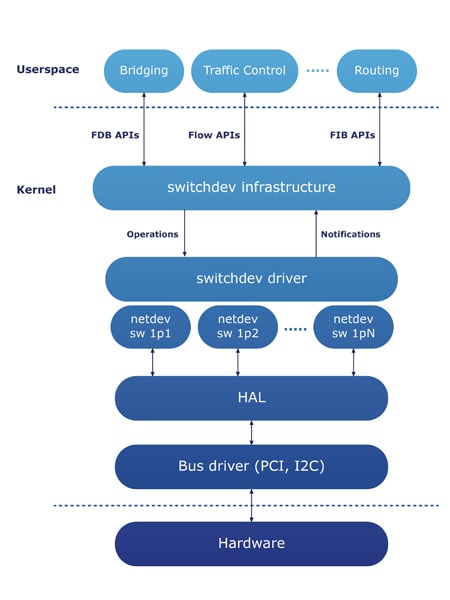Switchdev – a new Linux driver model for Ethernet switches and routers – is making its way to the white box market as a one-of-a-kind solution that matters.
Why the market needs a solution like Switchdev
As a result of increased data being transferred between networks, an influx of pressure to sustain these demands continues to rise. Network hardware vendors are challenged to offer more intuitive, flexible and easily customized solutions. The traditional complex and heavy-weight, vendor-dependent infrastructures will no longer be sufficient for the continually changing customer needs stacking against them.
Usually, ASIC vendors have provided their packaged userspace SDK (Software Development Kits) to enable an interface for hardware. In the past, to create a switch or a router product with their switching silicon, OEMs/ODMs needed a proprietary NOS or a mature open-source option like SONiC.
While this combination was enough to get the job done, it wasn’t proving to be efficient for meeting the changing market needs. Hardware vendors were struggling to enable the new technologies and protocols required for scaling network structures and the growth of application demands, often resulting in costly innovations and dissatisfied customers.

Modern networks are in need of a better solution. When Switchdev entered the picture, it helped solve this dilemma for vendors as it simply utilizes a familiar, open source framework, putting a burdensome SDK out of the equation. Vendors who adopt Switchdev in their hardware solutions, can offer their customers the flexibility and freedom of the well-known Linux environments and tools, breaking vendor lock-in to better support their demands.
Defining Switchdev

Switchdev driver
Switchdev is a Linux Kernel infrastructure layer that allows offloading the kernel’s forwarding data plane to the switch’s ASIC. This way, it enables the replacement of proprietary SDKs and NOSes with a standard open Linux interface. Rather than looking outside for new innovations, Swtichdev’s in-kernel model revamps existing Linux network tools and applications. This approach is effective for both the server side on SmartNICs as well as routers and switches, allowing end users to eliminate the dependency of vendor-specific APIs. Switchdev also deploys a unified interface that simplifies the integration, set up, and support process. For OEM/ODM vendors, this Linux driver does not require a powerful CPU to run. The Switchdev-powered NOS is more lightweight than, for example, SONiC. The implementation of Switchdev’s open source Linux infrastructure supports the disaggregation and open networking approach.
SmartNIC vendors can leverage the open Linux-native interface to provide control over their hardware (network processor, packet processor, FPGA or, multicore CPU). Modern servers are capable of running hundreds of virtual machines or containers in parallel. This creates another challenge to manage network connectivity between them and the outside world. To configure communication between physical and virtual ports, Switchdev serves as a sort of management panel for NIC management on the server side.
How can businesses benefit?
Switch silicon (ASIC) vendors are looking to reach and expand the white box market with the segments of mid- and low-end commodity switching and routing. To do this, they must offer open, flexible and standard solutions that are also affordable. By adopting Switchdev they can do just that, enabling a new, simplified infrastructure for their customers.
As a result, ASIC brands can expand their business among companies building network infrastructures on open source solutions – communities like OCP, Linux Foundation. Designs that use Switchdev to manage network functions, help hardware vendors to be automatically included on the vendors list for innovative solutions like Amazon Walk Out. Offering Switchdev for price-sensitive markets, such as ROBO (Remote Office Branch Office), SOHO (Small Office Home Office) and SMB (Small Medium Business), is a cost-efficient way to deliver the results they are wanting.
By implementing Switchdev as their open source infrastructure framework, equipment manufacturers (OEMs, ODMs) may offer their buyers to use the network operating system (NOS) of their choice, opening themselves up to greater flexibility. Using open Linux tools like Switchdev, allows switch or router vendors to eliminate licensing costs of proprietary NOSes or network management systems, as well as the excessive efforts needed to integrate merchant switching silicons. This makes room for more cost-efficiency when applied to product costs.
Switchdev brings added benefits by omitting the need to retrain personnel with each new product. By simplifying the new platform adoption process, thanks to unified Linux interfaces, end users save time and money during the infrastructure deployment and support process. Also, the efforts required for continual personnel training can be significantly reduced. No matter which specific hardware capabilities end users need, Switchdev-based NOS is a top choice for the white box model.
SmartNIC vendors can attract new markets and increase potential revenues by extending their offer to telco and enterprise data centers. In order to be utilized in modern network environments, their product should be integrated with a datacenter or network management or orchestration system (OpenStack, Kubernetes, XCloud, etc.). A Linux native interface, Switchdev is an effective way to manage networks.
Leverage Switchdev, Linux kernel and NOS expertise from a savvy, open source software development partner.
Linux Kernel community support
The Switchdev project is hosted by the Linux kernel (specifically netdev), an open source project community under the Linux Foundation’s umbrella. As changes are made in the Linux kernel, whether adding new features or solving critical bug fixes, this community ensures Switchdev is alive from within the infrastructure.
Linux offers numerous applications that fulfill various networking protocols. The main desire is for these protocols to leverage hardware capabilities of switches, or switching silicons (offload traffic processing), versus running solely within the Linux kernel, abusing general-purpose CPUs. To transform the basic, fundamental level of Switchdev into a full-scale, commercial-grade NOS (DENT) for a white box model, the Linux Foundation is building an application ecosystem around Switchdev.
Among the founding members are Amazon and other prominent, innovative network hardware vendors like Mellanox Technologies (acquired by NVIDIA in 2019), Marvell Semiconductor, Edgecore Networks, Delta Electronics, Cumulus – a network operating system vendor (acquired by NVIDIA in 2020), and Wistron NeWeb (WNC). Innovium, a chipmaker and networking solution vendor, joined as a general member.
SwitchDev Driver Development for a Switch Silicon Vendor
Download the case study to learn more about development, testing and implementation of the SwitchDev driver, the essential component of DentOS, for the Client's switch silicon family.
Companies that offer Switchdev
Various progressive market players have already adopted Switchdev and are seeing much success. These “ahead-of-the-curve” suppliers have capitalized on the swap to Switchdev, providing their customers increased satisfaction. Let’s glance at a few of these companies to see what they are offering.
Mellanox Technologies was the first to adopt the Switchdev model. To better meet the needs of their customers, the company created the Mellanox Linux Switch – a combination of the Open Ethernet Spectrum switch and Linux Switchdev driver, which optimizes data center performance, lowers the cost of ownership, and gains a higher return on investment.
Locking in a powerful presence on the open source market is Cumulus Networks. They recently revealed their 4th generation of open networking, Cumulus Linux 4.0 – the most reliable, robust and performant network version yet.
Cumulus now offers Switchdev commercial-grade support. The company enabled Linux kernel routing and bridging stacks to work natively on data center switches and routers. With devices operating under the common denominator of Switchdev, end users can see faster innovation, secured maintainability, and greater success.
Other companies also jumping on board with the Switchdev adoptions, which helps form a complete ecosystem of applications around it, include:
- Broadcom – offering switches that support Switchdev
- Microsemi – offering Switchdev driver for gigabit Ethernet switch
- Microchip – soon releasing an Ethernet switch
- XCloud Networks – providing cloud-grade, open-networking automation across Switchdev, SONiC, and Cumulus NOS
- Netronome – SR-IOV Switchdev mode (devlink)
Key factors for successful implementation
Switchdev implementation requires specific software development expertise, namely in Linux kernel, drivers and applications which is hardly available in the market. In order to successfully perform such implementation, strong low-level networking and embedded software development credentials are required, including a knowledge of various switching silicon SDKs, experience in platform integration and enhancement. Expertise in network operating systems (NOSes) is also crucial when it comes to closing gaps in developing a fresh-open NOS for Linux and making it production-ready for real-life deployments.
When implementing the Switchdev driver for their products, ASIC and SmartNIC vendors will require testing and upstream of the Switchdev driver for their product to Linux kernel, done in intensive collaboration within the open source community. Equipment vendors need to adapt Switchdev for their products, bring it up on their platform, ensure quality and resolve porting issues that might occur with the new box. Then, the platform-specific code needs to be upstreamed to open-source, ensuring it is supported in future Linux distribution versions.
While SmartNIC vendors are accustomed to contributing to open source within the netdev project, they may have to delegate the responsibility of upstreaming their hardware-dependent driver to Linux kernel, if an experienced open source development partner is in place. For businesses like ASIC and OEM/ODM vendors, this sort of partnership can be a pressing need.
Conclusion
Switchdev is a new, promising technology which supports the concept of open networking and disaggregation, empowering the white box model with numerous benefits, such as:
- Offering well-known familiar interfaces and tools
- Helping break vendor lock-in
- Being light-weight
- Leveraging community support with solid development perspectives
- Enabling cost efficiency for price-sensitive markets
However, marketplace expertise in Linux kernel driver and application development is scarce. Hardware vendors are often not accustomed to working with open source communities. In order to find the success they are looking for in flexibility and cost-efficiency, implementing the Switchdev driver with precise professional software guidance, is the way to go.
Software development companies who specialize in open source technologies and are experienced in working with open communities like Linux kernel, can help guide the required implementations to help you improve your product and launch it in new markets. Whether you want to develop a Switchdev driver or introduce Switchdev support for your networking equipment, PLVision comprises all the required factors and is ready to assist you with your open source software development needs.
- 10 Reasons NOT to Deploy
SONiC NOS in Your Network - July 12, 2024 - Choosing the Right SONiC Version for Your Network Infrastructure - May 15, 2024
- SONiC-DASH: Integration for a DPU in 4 Steps - January 23, 2023




